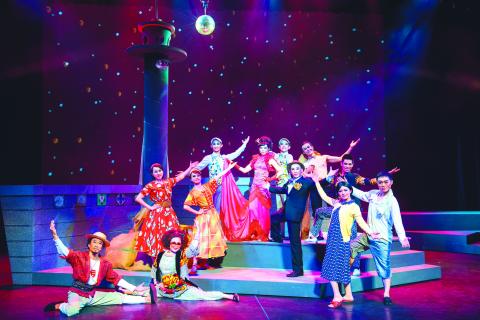Golden Bough Theater (金枝演社) will be celebrating its 20th birthday with a brand new production of its hit musical Happiness (浮浪貢開花), which spawned two sequels after its 2006 debut. The new production, described as a “luxury edition,” brings a top-notch cast and gives star billing to double Golden Melody award winner Tseng Hsin-mei (曾心梅).
When it was founded in 1993 by Wang Rong-yu (王榮裕), Golden Bough dedicated itself to creating a modern yet grassroots style that could revive the popular appeal of local theater.
It is one of the few major theatrical groups that perform predominantly in Hoklo (also known as Taiwanese), rooting its shows in the language and culture of native Taiwanese. With its soap opera sensibility, melodramatic emotions, exaggerated performance style and a stream of hummable tunes, its shows have an exuberant kitschy quality that belies its expressive power. Wang, a veteran of Cloud Gate (雲門舞集) and U-Theater (優人神鼓), has drawn on a mix of ideas drawn from traditional and modern experimental theater to create a style of drama that differs from that which Asia has inherited from the West, and is able to embody the joy of old-style folk theater in a contemporary setting.

Photo courtesy of Golden Bough Theater
Tseng will be performing the role of Miss Meizhi (美智小姐), a songstress who developed her career in the US, but then succumbed to homesickness and returned to her hometown. In a press release, Tseng said that as a child she would often sing as her mother made handicrafts. After she became a well-known singer, she still fondly recalled these times, and could appreciate the feelings of Miss Meizhi, who longs for the simplicity and easy intimacy of rural life in 1960s Taiwan.
The original production was made on a relatively small scale and has been regularly revived since it first premiered at Taipei’s Red House Theater (紅樓劇場).
Kate Shen (沈婷茹), publicity manager for Golden Bough, said that this new production was an upgrade of the original, bringing in bigger names, notably Tseng, and redesigning the stage for greater realism.
Tseng, who is one of the divas of contemporary Taiwanese pop music and who is an experienced TV show host, will be taking to the stage for the first time for Happiness, but given the extensive musical content, she is likely to feel right at home. A number of new songs have been added to the track list, and the tone of the show is like a homage to a golden age, both of the Taiwanese music hall, but also for an idyllic age of simplicity and absurdity, of greater hardship but deeper human intimacy.
In addition to this new production of Happiness, Golden Bough will also be putting on two new shows for its 20th anniversary, one an offshoot of the Happiness series, the other a one-man adaptation of Hamlet by Golden Bough’s lead actor Shi Tung-lin (施冬麟).
Happiness opens in Greater Kaohsiung for two performances today and tomorrow at 7:30pm and 2:30pm respectively, and will be in Taipei City July 26 to July 28 for four shows before rounding off its tour in Tainan on August 17. Tickets for Greater Kaohsiung and Greater Tainan are NT$300 to NT$1,500, for Taipei City they are NT$400 to NT$1,800; available through National Theater Concert Hall ticketing and online at www.artsticket.com.tw.

A vaccine to fight dementia? It turns out there may already be one — shots that prevent painful shingles also appear to protect aging brains. A new study found shingles vaccination cut older adults’ risk of developing dementia over the next seven years by 20 percent. The research, published Wednesday in the journal Nature, is part of growing understanding about how many factors influence brain health as we age — and what we can do about it. “It’s a very robust finding,” said lead researcher Pascal Geldsetzer of Stanford University. And “women seem to benefit more,” important as they’re at higher risk of

Eric Finkelstein is a world record junkie. The American’s Guinness World Records include the largest flag mosaic made from table tennis balls, the longest table tennis serve and eating at the most Michelin-starred restaurants in 24 hours in New York. Many would probably share the opinion of Finkelstein’s sister when talking about his records: “You’re a lunatic.” But that’s not stopping him from his next big feat, and this time he is teaming up with his wife, Taiwanese native Jackie Cheng (鄭佳祺): visit and purchase a

April 7 to April 13 After spending over two years with the Republic of China (ROC) Army, A-Mei (阿美) boarded a ship in April 1947 bound for Taiwan. But instead of walking on board with his comrades, his roughly 5-tonne body was lifted using a cargo net. He wasn’t the only elephant; A-Lan (阿蘭) and A-Pei (阿沛) were also on board. The trio had been through hell since they’d been captured by the Japanese Army in Myanmar to transport supplies during World War II. The pachyderms were seized by the ROC New 1st Army’s 30th Division in January 1945, serving

The People’s Republic of China (PRC) last week offered us a glimpse of the violence it plans against Taiwan, with two days of blockade drills conducted around the nation and live-fire exercises not far away in the East China Sea. The PRC said it had practiced hitting “simulated targets of key ports and energy facilities.” Taiwan confirmed on Thursday that PRC Coast Guard ships were directed by the its Eastern Theater Command, meaning that they are assumed to be military assets in a confrontation. Because of this, the number of assets available to the PRC navy is far, far bigger